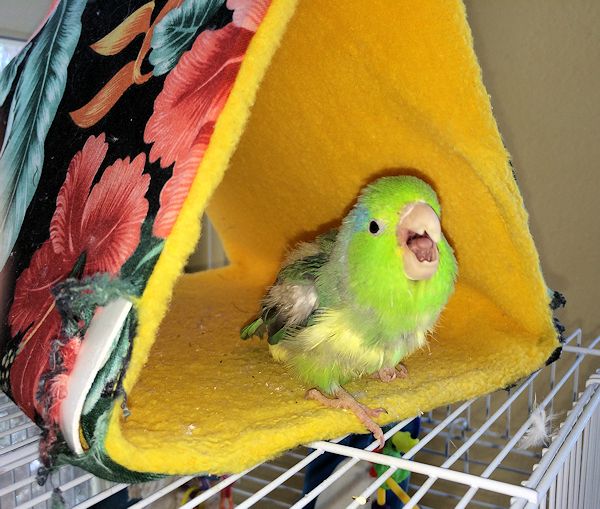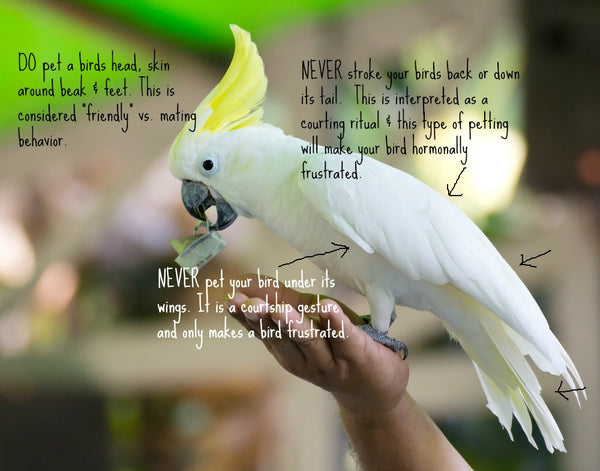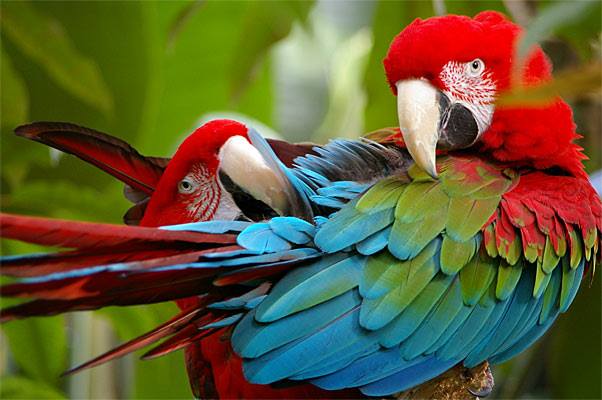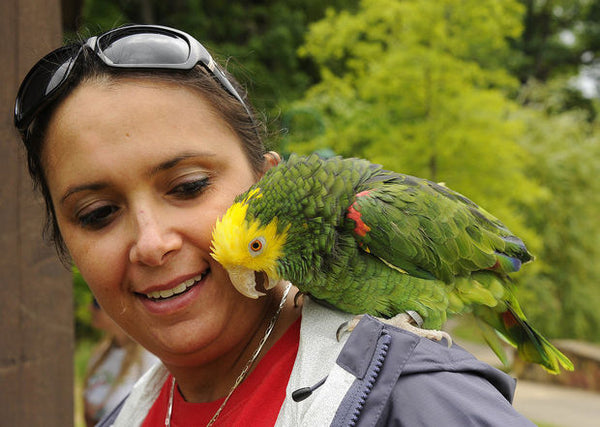If you're trying to figure out why your bird is feather plucking, take a look at the role that bird hormones may be playing in the disorder. Chronic hormonal behavior in Birds is more common than you think. As a bird behaviorist, I get calls from people describing bird hormonal behavior all of the time.
All adult birds get bird hormones each Spring and that's to be expected. But, having bird hormones all of the time is unnatural.
Most people are unaware that they are accidentally inducing an unnatural, chronic hormonal state in their bird that wreaks havoc on its physical and mental health. The problem of chronic hormones in parrots contributes greatly to feather plucking parrots.
What Are Normal Bird Hormones?
In the wild, most birds only mate for a short period of time each year. It’s only when a precise set of physical and environmental conditions simultaneously come together that bird hormones come into play. After the seasonal period ends, bird hormones resume a dormant phase.
In a home environment, our pet birds are often subjected to a set of environmental conditions that induce an unnatural hormonal state. We call this chronic hormonal disorder. This disorder is often preventable with attuned parrot husbandry practices.
Avian vets describe that they see case after case of chronically hormonal birds each week. These birds are displaying significant behavioral issues such as aggression and feather plucking or dealing with life-threatening health issues related to the disorder. In this blog post I will address 5 links between bird hormones and feather plucking.

5 Ways To Stop Hormonal Behavior In Birds
Bonding with a perceived mate: Your bird is not racist or even species-specific in its love interests. It may perceive you as its mate. Or, in my case, Smokey, my African Grey has fallen in love with my chihuahua, Pilar!
Birds have been known to develop a mate-like bond with other family pets, a stuffed animal, or even their own image reflected in a mirror. A bird that is “in the mood” displays crouching behavior and it may coo and ruffle its feathers.
Diet: High levels of fat, starches and/or protein physically prepare a bird's body to mate and create young. Warm, moist food, in particular, can bring on hormonal surges.
We often think that we're showing our birds love by treating it with high-fat nuts, starchy table foods, and starchy foods. But, really, we're just satisfying our own needs in a way that causes bird hormones to surge.
Birds in love regurgitate warm protein, fat, and starch rich foods into their mates mouth as a form of foreplay. If your parrot is regurgitating when it is around you, it is likely that it is hormonal. Try to improve your bird’s diet to include more raw, plant-based products. The works of Karmen Budai have been a wonderful resource for me.
Access to perceived nesting sites and materials: A bird’s idea of a love nest and your idea of one may be completely different. Your bird would be perfectly happy building a nest in a cardboard box, under your sofa or dresser, behind couch cushions or even in a shoe! Toss out those Bird Snuggle Huts and get your pet a flat perch instead.
Carpet fibers, toy fibers, and especially shredded paper all work fine. Take a look around. Does your bird have access to nesting spots and nesting materials? Is it constantly trying to shred things?
Shredding causes bird hormones to go into overdrive. This needs to change immediately. Commit to eliminating access to nesting materials and sites altogether.

Affectionate Petting: What loving pet owner doesn’t enjoy giving their bird a good massage? After all, your bird loves it. So, you end up stroking its back and massaging it under the wings, and maybe even around the vent area.
Your bird just coos with pleasure. Who can blame it! Really? Who doesn't love foreplay?
Just like you, your parrot's body sexually responds and prepares to mate with a good massage.
Stop giving your bird the wrong idea! Limit petting to the head and feet. Your bird will probably throw a hissy fit for a while until its hormones get balanced. But, once balanced, it will feel so much better. And, its behavior will improve, to!
All joking aside, the lengthening days, whether it is from natural sunlight or artificial light triggers a hormonal response in our pet birds. Simply put, a parrot needs 10-11 hours of complete darkness each night.
So, if the sun rises at 7:00 am, bedtime needs to be around 8:00 pm. Long photoperiods cause bird hormones to increase in size and secrete reproductive hormones into the bloodstream. The bird’s body is fooled into responding as if it were the bird hormonal season. If you’re having trouble putting out the lights so early, get a bird sleep cage.

Take a moment to identify how you'll curb bird hormones so that your pet can achieve hormonal balance.
Remember earlier when I mentioned that wild parrots only mate seasonally? Constant hormonal states not only damage important body structures but they can also mentally affect your pet, causing significant stress. This constant mental stress is known to induce parrot plucking.
Take a few minutes to jot down your thoughts on which of these conditions you could improve upon? How will you protect your bird?
- ___________________________________________
- ___________________________________________
- ___________________________________________
















